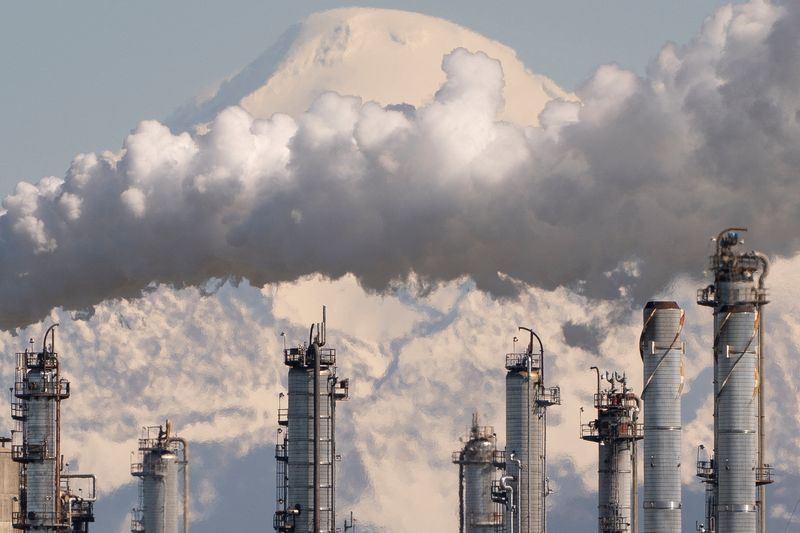By Timothy Gardner
(Reuters) – A ballot initiative to abolish Washington state’s carbon market, if passed next week, would send an ominous signal to other U.S. states and Canadian regions seeking to build markets aimed at cutting emissions that blaming scientists for climate change.
The carbon market, formed by the state’s Climate Commitment Act (CCA), has raised more than $2 billion since its launch in 2023 for programs such as transit, wildfire protection and salmon protection.
It is backed by Native American tribes and environmental groups, as well as BP (NYSE:), a global energy company that is preparing for the potential wider adoption of such markets.
Hedge fund manager Brian Heywood is leading the initiative to repeal the scheme in the November 5 elections. He blames the CCA, which imposes emissions limits on about 100 of the state’s biggest polluters, for pushing Washington’s gasoline prices to the highest in the U.S. by mid-2023.
Heywood, the Republican millionaire and CEO of Taiyo Pacific Partners, is holding rallies for the initiative at gas stations, where he gives drivers money to lower the cost of refueling.
“The guys who have to drive 45 minutes a day in their 2002 Honda (NYSE:) sedans, they’re the ones getting crushed, and no one is standing up for them, so I am,” Heywood told Reuters.
Proponents of cap-and-trade carbon markets say they can efficiently tackle carbon emissions by harnessing the power of capitalism.
In such markets, the government sets gradually decreasing limits on carbon pollution. The industry can meet the limits by reducing emissions through investing in clean energy. If they reduce emissions, they can sell allowances to other emitters who choose not to make the efficiency investments.
Washington’s market could eventually be linked to similar mechanisms in California and Quebec, which financiers say would give industries a wider choice of credits.
Luke Sherman, a carbon markets analyst at the consultancy Energy Aspects, said how votes in Washington could influence decisions in states like New York, which has proposed a carbon market to meet its 2050 carbon emissions targets, and New Jersey and Maryland, where some lawmakers support carbon markets.
It could also convince California and the northeastern states of the Regional Greenhouse Gas Initiative to broaden or shrink existing carbon markets to more industries.
“How ambitious they want to be can certainly be influenced by their perception of voter support or Washington’s rejection of carbon pricing,” Sherman said.
‘REQUIRES SOME SOLUTIONS’
Washington state’s auctions of emissions allowances also generate revenue that is invested in projects from clean transit to salmon fishing.
Kelsey Nyland, a spokesperson for No On 2117, named after the ballot measure, said if the measure passes it would save billions of dollars in funding, impacting “every corner of our state,” preventing major road and bridge projects that addressing congestion, safety and freight mobility would be addressed. are at risk of being postponed or even canceled.”
Community Transit, which serves Puget Sound, said it would lose about $200 million through 2038. Programs that could be affected include bus rapid transit, an efficient service with dedicated lanes.
“The last thing we want to cut back on is service to our customers, but that could certainly happen,” says spokesman Martin Munguia.
A poll conducted in October, sponsored by The Seattle Times and others, showed that 48% of respondents oppose the initiative, 30% said yes and 22% were unsure.
Big fossil fuel companies could help overcome the measure.
BP is working to defeat the initiative “because it moves the state backwards on climate action and jeopardizes funding for key transportation infrastructure and other low-carbon projects,” a spokesperson said.
BP owns Cherry Point, the largest oil refinery in the Pacific Northwest. Asked whether it might oppose the measure because it would make any pollution rights it holds worthless, BP pointed to Washington state rules that prohibit the disclosure of details of market positions.
Energy Aspects’ Sherman said if the measure passes, energy companies could face new state emissions rules that are more blunt in nature than carbon pricing.
“These regulations could be more expensive for some issuers than their obligations under the cap-and-invest program,” Sherman said.

The Western States Petroleum Association has not opposed CCA, but wants changes to prevent fuel price spikes.
“Regardless of election results, the program needs a number of solutions to be affordable to consumers and sustainable in the long term,” said Jessica Spiegel, vice president of WPSA’s Northwest Region.


